Dental fillings are essential for restoring teeth affected by decay or damage. Proper care is crucial to ensure their longevity and maintain oral health. This blog explores effective strategies for caring for your dental fillings.
Understanding Dental Fillings
What Are Dental Fillings?
Dental fillings are materials used to fill cavities caused by decay or trauma. They restore the tooth’s function and prevent further decay.
Types of Dental Fillings
Several types of dental fillings are available, including amalgam, composite resin, ceramic, and gold fillings. Each type has unique benefits and considerations.
Immediate Care After Fillings
After getting a dental filling, it’s normal to experience sensitivity or discomfort. Here’s how to manage immediate care:
- Avoid Hard Foods: Stick to softer foods initially to avoid stressing the filling.
- Manage Sensitivity: Use over-the-counter pain relievers as recommended by your dentist.
Daily Care Routine
Brushing and Flossing Techniques
Proper brushing and flossing are essential for maintaining dental fillings:
- Use a Soft-Bristled Toothbrush: Brush gently twice daily, focusing on areas around the filling.
- Floss Regularly: Clean between teeth and around the filling to remove plaque and food particles.
Importance of Fluoride Toothpaste
Fluoride helps protect teeth from decay and strengthens dental fillings. Use fluoride toothpaste to maintain oral hygiene.
Dietary Considerations
Foods and Beverages to Avoid
Certain foods and drinks can damage dental fillings:
- Hard Candies and Ice: These can crack or dislodge fillings.
- Acidic Foods: These can weaken tooth enamel and increase sensitivity around fillings.
Nutritious Foods
A balanced diet rich in vitamins and minerals supports oral health and helps maintain strong teeth and fillings.
Hygiene Practices
Regular Dental Check-ups
Regular visits to your dentist are crucial for monitoring fillings:
- Schedule Check-ups: Visit your dentist every six months or as recommended.
- Professional Cleaning: Cleanings help remove plaque and tartar buildup.
Signs of Potential Issues
Recognizing Filling Problems
Be aware of signs indicating problems with dental fillings:
- Increased Sensitivity: Sensitivity to hot, cold, or pressure.
- Pain or Discomfort: Pain around the filled tooth, especially when biting down.
When to Contact Your Dentist
Contact your dentist if you experience any filling problems to prevent further complications.
Maintenance Tips for Longevity
To ensure your dental fillings last, follow these maintenance tips:
- Practice Good Oral Hygiene: Brush and floss regularly to keep teeth and fillings clean.
- Use Fluoride Products: Include fluoride toothpaste and mouthwash in your oral care routine.
- Avoid Damaging Habits: Don’t bite on hard objects or use teeth to open packages.
- Visit Your Dentist: Schedule regular check-ups to assess fillings and address concerns promptly.
For more information on maintaining dental fillings in Lane Cove, visit Lane Cove Family Dentist for expert care.
Conclusion
Caring for dental fillings is essential for preserving oral health and ensuring their effectiveness. By following these tips and prioritizing dental care, you can maintain strong, durable fillings.
Keep an eye for more news & updates on WebOfBuzz.Com!




